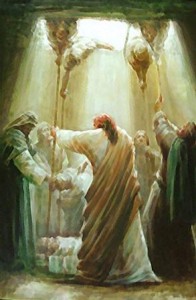 Today’s Gospel reading from Mark 2:1-12 is the breakthrough story of the paralytic, whose friends, seeing that the immense popularity of Jesus prevents access to Him, open up the roof of the house where Jesus is staying and lower the child to Him. Upon seeing this extraordinary act Jesus is moved to heal the paralytic. This true story teaches me that faith alone is not enough to produce the fruit of a perfected soul; it takes action, which is works.
Today’s Gospel reading from Mark 2:1-12 is the breakthrough story of the paralytic, whose friends, seeing that the immense popularity of Jesus prevents access to Him, open up the roof of the house where Jesus is staying and lower the child to Him. Upon seeing this extraordinary act Jesus is moved to heal the paralytic. This true story teaches me that faith alone is not enough to produce the fruit of a perfected soul; it takes action, which is works.
If the body is like the soul, then being paralyzed and being healed are respectively like injury and health to the soul. Our sins paralyze us to the point that all we can do is see our sins, lament them and dwell on them even after we are forgiven through the sacrament of Penance and Reconciliation.
In the first reading for today from Isaiah 43:18-25 God tells us that he has forgiven our sins and remembers them no more. At first reading this is a conundrum because, if he truly doesn’t remember or sins, if they are blotted out with absolutely no trace, then how is it that God knows of them to be able to say that they are wiped out? In short, why does he bring it up at all? At second consideration and closer inspection, we see that it is the Israelites who burden God with their sins. It is the people who are bringing up the issue, in essence saying no to the grace of God. God is just responding to their laments and even their chronic failures. Their sins were indeed forgiven but their actions showed no conviction.
The second reading (2 Corinthians 1:18-22) is a departure from the constant worrying over sins toward inconsistency in faith. In the next reading, Saint Paul is defending his honor, not for his own sake but for the Corinthians’ sake, saying that his word declaring Jesus to be the Son of God and the messiah is not wavering because he (Paul) cannot be with them. Paul reminds those at Corinth that in baptism they have received something greater then him self; namely they have received the very Spirit of God. Like God the father in the first reading, Paul reassures the Corinthians that even though he cannot be with them as originally intended it does not mean that he has said no one minute and yes the next. It does not mean that they should have reason to doubt the message of faith in Christ, since the Holy Spirit, who is the first deposit of faith, dwells in them. The Corinthians are like the Israelites in having doubt and accusing Paul of causing it by not returning to them as he had initially planned.
The third reading is perfected faith; it is faith in action. The four men who carry the paralytic are so convinced that Jesus will heal their friend/relative that they remove every obstacle to get to Jesus. Often times our sins paralyze us from accepting grace. We think so low of ourselves because of what we have done that we imagine ourselves unredeemable and unworthy. This is wrong thinking primarily because, like accusing Paul of inconsistency, it fails to recognize the perfect and unwavering mercy of Jesus Christ. Yet, once we have immobilized our faith, we have no one to help us reach Christ except those connected visibly in the Church on earth and invisibly by communion with those in Purgatory and the saints and angels in Heaven. So if we are reconciled to Christ – the head – and to the Church, which is the body, then we have the austere responsibility to assist those who by their actions have become paralyzed.
How then can we, like the four men in the Gospel reading, lower others through the roof to Christ? I think it takes the three Lenten practices: Prayer, fasting and alms giving (sacrifice). Prayer first, because it prepares us for right action, it puts others before ourselves, and it brings us closer to God who is the source of all goodness. Fasting because in it we learn to deem all things superfluous; man does not live by bread alone but by every word of God. Alms, which I do not limit to giving money but other commodities like time and effort, skills and labor without pay, and giving up pleasures and conveniences, because in making such sacrifices, in giving of ourselves we show faith and it is those acts of faith that move Christ to heal.
Enjoyed this reflection, Tim. I am learning so much from you and our whole group. I’m smiling as I sit here realizing some modern phrases probably stemmed from this story…”Brought down the house” or “Going through the roof…” I know we need the perseverance that only comes from the Holy Spirit as we pray to lead our friends and family to Christ. Sometimes I feel like a little bird pecking away at that roof… May Our Lord whisper in our ear today how we can make a “breakthrough” and, in the meantime, be nourished and renewed by His Presence.